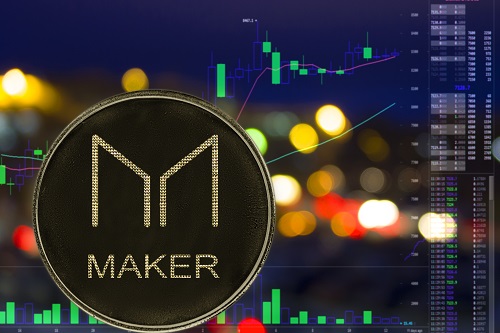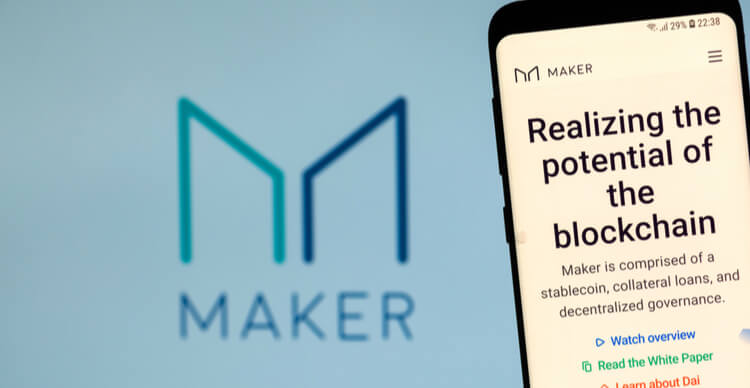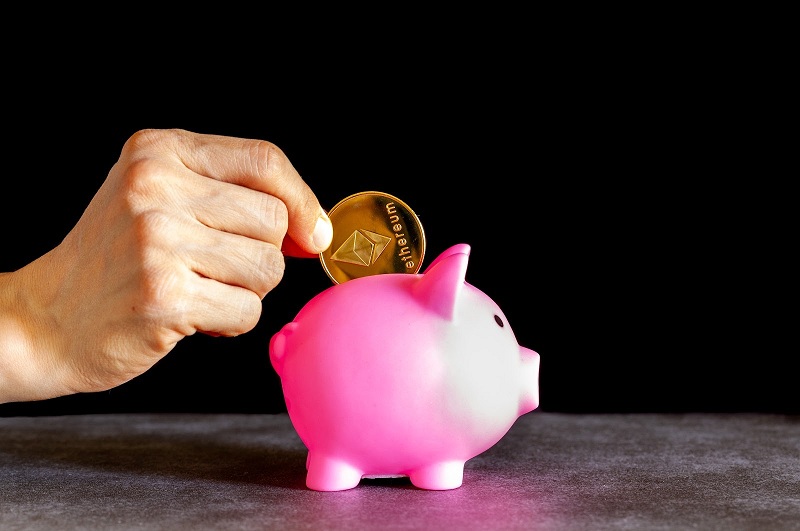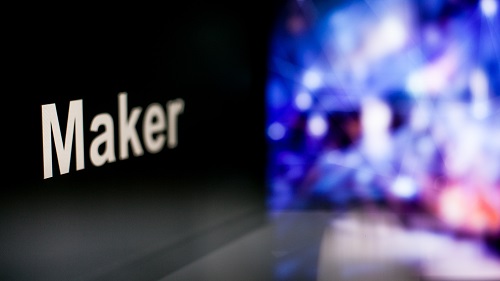What is Maker & How Does it Work? - MKR for Beginners
...
Decentralised finance (DeFi) is one of the leading areas in the cryptocurrency space at the moment. Thanks to DeFi, people from all parts of the world can gain access to financial services in a decentralised manner.
Maker is one of the top DeFi lending platforms in the world. It is a unique cryptocurrency project that combines both decentralised finance and stablecoins. It makes it easy for people to take out loans and pay them back after a stipulated period. The MKR token is also unique because it is used by the MakerDAO to govern the Maker Protocol. The former is a decentralised autonomous organisation, while the latter is a software protocol, and both are hosted on the Ethereum blockchain.
Why Was Maker Invented?
The Maker token was developed to serve as the governance cryptocurrency of the MakerDAO and Maker Protocol. The MKR token basically gives users voting rights on the platform. Unlike some DeFi protocols out there, Maker doesn’t pay dividends to the holders of the MKR token. Instead, the holders have voting rights over developments and updates that are proposed on the Maker platform.
Some of the proposals MKR token holders get to vote on include adding new collateral asset types to the DeFi platform, changing the risk parameters for collateral asset types, amending the DAI Savings Rate, upgrading the DeFi platform and more.
Since the MKR and DAI tokens are linked, having the ability to partake in the management of a leading stablecoin is a unique feature that drives the value of the MKR token. Another unique feature of MKR is that its dynamic supply serves as a recapitalisation resource for when the DAI generated from liquidation isn’t enough to cover outstanding debts. When that happens, new MKR tokens are minted and sold to cover the remaining debt. On the other hand, when more DAI than necessary is generated, excess DAI is used to buy back MKR and burn it, thereby decreasing the supply of MKR.
MKR holders are therefore incentivised to govern DAI well to avoid inflation of the MKR supply and devaluation of their MKR tokens.
How Does Maker Work and What Technology is Behind It?
It is impossible to discuss the MKR token without talking about the DAI stablecoin. This is because the Maker Protocol needs the two tokens in order to operate. The DAI stablecoin is created when a Maker Protocol user locks another digital currency like ETH into the platform to obtain a loan in DAI. Afterwards, the users can return the DAI stablecoin to reclaim the cryptocurrency they locked as collateral.
The primary objective of the MakerDAO protocol is to have a decentralised operating and governance system that makes it possible to create a stablecoin (DAI) with a global reach. Furthermore, the MakerDAO protocol also seeks to be a mechanism that allows people to enjoy DeFi services using cryptocurrencies.
It is for the governance purpose that the MKR token was created. For the MakerDAO protocol to function properly and to continue to grow, the MKR token is used to govern the ecosystem. The token is used to determine the changes that ensure that DAI operates smoothly.
The MKR tokens are used to vote on proposals that affect how the DAI stablecoin is used. MKR token holders have the power to determine a wide range of things, such as which cryptocurrencies can be locked into the DeFi protocol or the price the platform will liquidate the locked assets.
An individual who holds MKR can vote on key decisions via Executive Voting. Once an Executive Vote is passed, changes are made to the Maker Protocol in line with the agreed proposal. Prior to executive voting, the Maker community goes through another voting process called the Proposal Polling. The Proposal Polling is an avenue for the MKR token holders to check out the sentiment around a proposal before the changes are voted on and implemented on the protocol.
In this regard, the Maker Protocol differs from the other stablecoin projects since the users get to determine changes in the networks. Meanwhile, with stablecoins such as USDT, USDC and others, the users have no governance rights.
Is Maker Real Money?
The Maker Protocol has two tokens, the MKR token and the DAI stablecoin. DAI has all the hallmarks of “real money” as its stable dollar peg means that it can be used as a store of value, a medium of exchange, a unit of account and a standard of deferred payment, ie, it is used to settle debts within the Maker Protocol.
The MKR token, on the other hand, cannot be defined as real money by these standards. The high volatility of its price makes MKR unsuitable for these purposes, and the token wasn’t designed for these uses anyway. MKR is a governance token used to vote on proposed changes to the Maker Protocol – something you can’t do with “real money”.
In the cryptocurrency space, stablecoins are more suited to serve the functions of money since their values are pegged to fiat currencies 1:1. Also, there are a few cryptocurrencies like DASH and Litecoin that are designed to serve as mediums of exchange.
Fees & Expenses of Maker
Just like every other cryptocurrency, there are fees attached to using the MKR token. For the MakerDAO Vaults, users need to pay a Stability Fee. The fee is a risk parameter of the protocol designed to take care of any inherent risk in generating the Dai stablecoin against collateral in Maker Vaults. The Stability Fee rates for the vaults are not constant as they are based on the decisions of MKR token holders who are in charge of the protocol.
Furthermore, as an MKR trader or investor, you will have to pay transaction fees when you purchase the cryptocurrency from crypto exchanges, brokerage platforms or P2P networks. The deposit, withdrawal and trading fees differ from one platform to another. Hence, we recommend that users properly check the transaction fees of a cryptocurrency exchange or trading platform before they proceed to buy MKR tokens.
What Are the Benefits of Maker?
Maker is the governing cryptocurrency of the Maker Protocol, and as such, it offers its holders a wide range of advantages. Some of them include:
Community governance
One of the key advantages of the MKR token is its community governance feature. MKR holders are given the task of participating in the governance of the Maker DeFi protocol. This power gives the users more control over the future of the DeFi platform as they decide the changes that will be implemented. Within the Maker ecosystem, the governance mechanism works well, thanks to the use of Active Proposal smart contracts. The smart contacts are designed in such a way that they provide users with control over the protocol, ensuring that there is a higher degree of transparency across the network.
Token holders get to make key decisions such as changing the policy for the Dai stablecoin, deciding on new coins to be accepted as collateral and improving the system of governance.
Fee burns
To ensure that the MKR token remains valuable, the protocol uses a deflationary mechanism. This system ensures that a small interest fee is paid in MKR tokens when a collateralised debt smart contract is closed. A part of the fee is burned, ensuring that the protocol maintains a healthy balance between its existing supply and the demand for the cryptocurrency.
Protocols with deflationary mechanisms have become quite popular within the DeFi space. This is to ensure that the DeFi platforms are not devalued by inflation caused by reward token issuance policies. The issuers of the MKR token know that it is impossible to issue tokens continuously and maintain their value.
Can Maker Be Used Anonymously?
The cryptocurrency market has become more regulated than it was a few years ago. Cryptocurrency exchanges are now required to implement KYC (Know Your Customer) and AML (Anti Money Laundering) policies to curb vices such as money laundering. Hence, this strips away the anonymity of using cryptocurrencies.
It is tough to use the MKR token anonymously. It is not a privacy-focused cryptocurrency. Rather, it is used as a governance token on the Maker Protocol. The MKR token holders are more concerned with using the cryptocurrency to govern the MakerDAO ecosystem.
How Safe is Maker?
The DeFi sector is still in its early days, and more is needed in terms of the security of the protocols. Over the past few years, we have seen a wide range of attacks on DeFi platforms, resulting in the loss of hundreds of millions of dollars. However, so far, there have been no major security breaches of the Maker Protocol.
Maker is hosted on the Ethereum blockchain, one of the leading and most secure networks in the cryptocurrency space. We encourage our readers to personally ensure the safety of their MKR tokens by storing the coins in cold storage wallets to obtain maximum security. Furthermore, make sure to implement extra security features like 2FA in your wallet.
What Teams Are Working On Maker Development
Maker was developed by Rune Christensen. Similar to the other leading DeFi protocols, the Maker ecosystem has been maintained by a wide range of independent developers globally. The development of the DeFi protocol happens based on the votes made by the MKR token holders. Developers can contribute to the Maker ecosystem through its Github repository.
Which Financial Institutions Are Invested in Maker?
A few financial institutions have invested in MKR tokens. Galaxy Digital, one of the leading digital asset managers in the world, holds MKR tokens, with 12.7% of its DeFi index fund allocated to the cryptocurrency. Leading digital asset management firm Grayscale also holds MKR tokens in its DeFi fund based on the CoinDesk DeFi Index. The cryptocurrency and DeFi ecosystem is still growing, and we might see some more financial institutions get in on the Maker protocol in the future.
Maker Mining
The Maker token is hosted on the Ethereum blockchain, and this means that it cannot be mined. As an ERC-20 token, MKR is not yet hosted on its own blockchain. The decision to mint new MKR tokens is decided by the token holders who are in charge of the protocol’s governance.
Maker Wallet
MKR is a leading DeFi token and is also hosted on the Ethereum blockchain. This means it is supported by a wide range of cold and hot storage wallets. Some of the wallets that support the MKR token include:
-
Ledger Nano X (cold storage wallet)
-
Ledger Nano S (cold storage wallet)
-
Trezor (cold storage wallet)
-
CoolWallet (cold storage wallet)
-
MyEtherWallet
-
Exodus
-
Atomic wallet
-
Trust Wallet
-
Crypterium Wallet
-
Coinomi
Any of the above wallets can be used to store the MKR tokens. Ensure you activate extra security features to provide maximum security for your MKR tokens and other cryptocurrencies.
Is Maker Worth The Investment?
Every investor has to decide for themself whether a financial asset is worth the investment or not. To make a decision on the MKR token, you need to study the MakerDAO project, understand what it offers and look at its possible future performance. With enough information on the project, you can make an informed decision to buy the token or not. Regardless of that, we always encourage readers only to invest an amount they can afford to lose due to the volatility of cryptocurrencies.
News

Maker price surges 7% amid $1.35 million audit contest
27 June 2024 Maker price rose more than 7% to lead altcoin gainers alongside Kaspa and Injective. Gains for MKR…
MakerDAO unveils two new tokens in a major overhaul
3 May 2024 The two new tokens teased by MakerDAO are NewStable (NST) and NewGovToken (NGT). NST replaces Dai and…
Whale dumps Ethereum (ETH) for Maker (MKR), is this trending DeFi token next?
26 September 2023 Whales often make moves that capture the attention of the entire crypto community. One such intriguing manoeuvre…
VeChain, Toncoin, Compound, Maker prices rise as US CPI spikes
13 September 2023 Altcoins like Toncoin, Compound, Maker, and Hedera Hashgraph jumped on Wednesday. The US published strong consumer inflation…
Maker (MKR) gains amid 2-month whale accumulation
31 August 2023 Maker price jumped Thursday, hitting intraday highs above $1,186. MKR was paring some of the gains as…